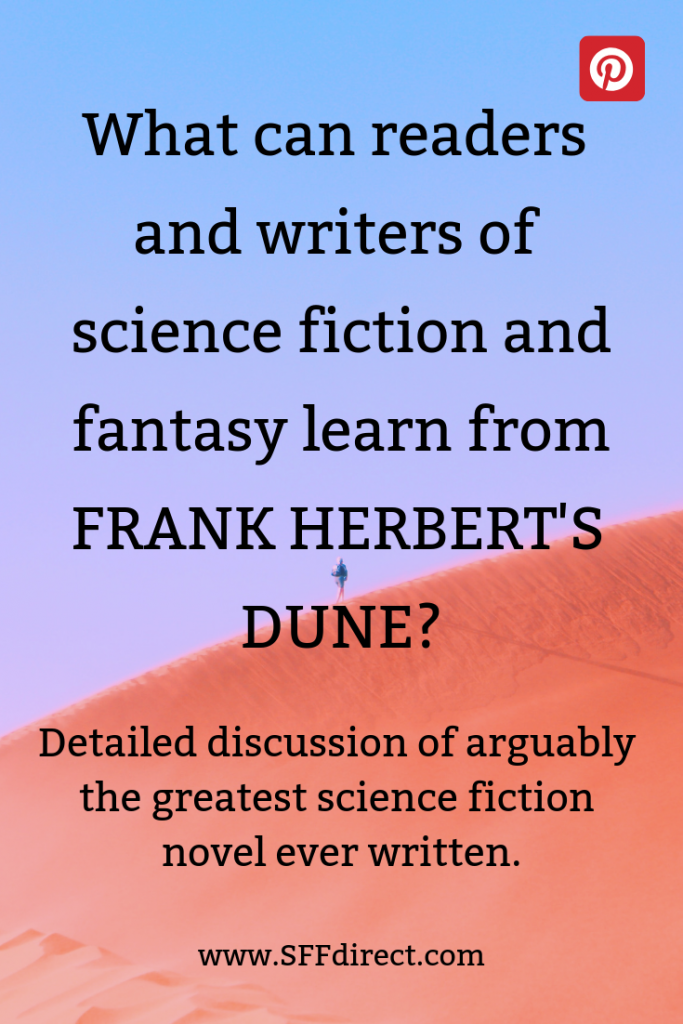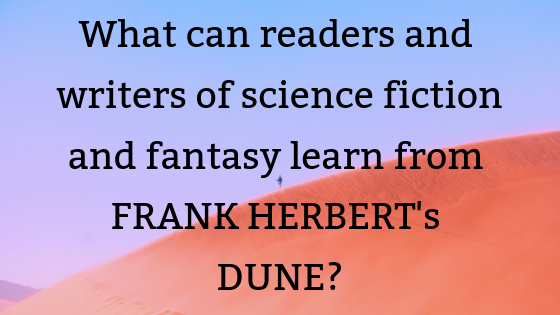I have a confession to make. Until last week I hadn’t ever read Frank Herbert’s Dune. As a lifelong fan of science fiction and fantasy, I realise that is a huge omission. I did start reading it as a teenager but was put off by the complexity of the beginning – I found it hard to understand and get my teeth into (more about the book’s beginning to follow).
I think I tried once more a few years later and again failed, although my memory on this is hazy. Anyway, for years whenever Dune came up in conversation with other SFF fans, I would smile and nod knowingly while inwardly despising myself for not having the balls to admit I just hadn’t read it. In this article I bare my shame and hopefully redeem myself a little!
(Interestingly, I came across an io9 blog post recently that listed Dune as one of the top ten SFF books people pretend to have read. Read it here.)
First of all, let’s talk about genre.
Genre
Where does Dune sit in the SFF spectrum? It’s hailed as the best science fiction book ever written, but is it really science fiction? Or more to the point is it just science fiction? I believe it has characteristics of fantasy:
- The worldbuilding in this novel is as great in scope as that I have encountered in the most epic fantasy novels. Yes, I know worldbuilding is not just a fantasy thing; science fiction novels must do this as well. It’s just that the breadth and depth of the worldbuilding in Dune truly reminded me of fantasy. And there are desert warriors, giant worm monsters, a society of witches, prophecies – things we might expect from fantasy.
- Dune doesn’t really contain a lot of science and technology. Or rather it doesn’t make a big deal of science and technology. Shields are present but never explained, the Fremen have excellent technology but it’s never revealed how they come by it/make it/generate the power for it. Because of this, some of the technology feels very much like magic. Also, no communication devices are used, like radio or mobile/satellite phones, nor is there television.
- The powers of the Bene Gesserit women feel very much like sorcery. I know they are taught their abilities, and the knowledge allegedly has a scientific foundation, but skills such as ‘The Voice’ seem very much like magic. And I fail to see how ‘Changing the Water’ is anything but magic.
- There are no computers in the Empire. Instead, humans with extraordinary mental powers (called Mentats) do the computations necessary for all technological tasks. Putting to one side the implausibility of this (how do their satellites work?) it reduces the SF-ness of the book’s atmosphere. This point is related to point two above.
Lessons from Dune on the above
Ultimately I think I have to conclude that Dune is science fiction because it leans more in that direction and there is (allegedly) no magic in this world. All the feats are performed by technology/principles grounded in the laws of science.
But the above has taught me that science fiction doesn’t have to be dripping in science and technology; it can be subtle. It’s also shown me how tenuous the line is between SF and fantasy, and that great worldbuilding is not just the prerogative of fantasy. Indeed, Dune is a masterclass in worldbuilding, and I think it will continue to be enjoyed by fans of science fiction and fantasy alike.
The march of time
Dune was first published in 1965 and it has aged very well. In my opinion, you can’t tell it was written over fifty years ago. I think this is partly due to the fact that, as discussed above, the science and technology is rarely explained and therefore cannot date – it simply exists as fulfilling a function. And a coming-of-age adventure story will always appeal to readers.
However, there are some ways in which the novel does betray its time. The main one is its treatment of women. The book is very male-dominated and there are few female characters. Of these, most are strong characters, but they derive their strength from Bene Gesserit training i.e. they have ‘superpowers’ rather than being normal strong women. There are also no women with economic or political power, and they are all subservient to men.
Another feature that signals that the novel isn’t contemporary is that the chief antagonist Baron Harkonnen is the only homosexual character in the book. I’m sure Frank Herbert wasn’t trying to say that homosexuality is linked with evil, but the association is still there and I don’t think a modern author would do it.
Lessons from Dune on the above
Dune is as readable and riveting now as it was the first day it was printed. It owes this to having an underlying story that appeals to human beings whatever their age/ethnicity/sexuality.
That said, society is very different now to when Dune was first published. Authors think more about diversity and how they portray women and LGBTQ characters. This can only be a good thing. We should be mindful, as writers, to keep diversity at the forefront of our thinking and be careful how we represent different groups.
More lessons from Dune
The beginning
As stated above, I found the beginning of Dune difficult to read. I think it was because there is a lot of information and crucial events thrown at the reader in the first fifty pages. While this is going on, you have to just try to follow the story and eventually you get used to the style and things become clearer.
In addition, the personality of the characters doesn’t really come through in the first pages because a lot of their conversation and other text is given over to explaining the world. So I didn’t feel a connection to any of the characters at first. I would urge new readers of Dune to persevere because the rewards are great.
For writers, though, I do think that there are lessons we can learn from this. In the first few pages of your book, try not to overwhelm the reader with information or the alienness of the culture. Make the personalities of your characters shine so readers can connect with them and feel they are on safe ground.
Point of View
Writers, pay attention to the point of view (POV) of Dune as you are reading it. You will notice it is written in third person omniscient POV; the novel is a masterclass in how to successfully write it.
Omniscient POV is unusual nowadays – if writers use third person, they tend to make it third person limited. This is where events are seen through the eyes and ears of a single character and the reader is privy to their thoughts and no-one else’s. The viewpoint character may change (for example from chapter to chapter) but the POV is always third person limited.
In omniscient POV, there is no single viewpoint character. The narrator knows all and is not limited to the eyes, ears and thoughts of a single character. They can show anything and can reveal the thoughts of any character. This POV was the preferred way of writing third person POV in Victorian times and has been tapering out until today, replaced by third person limited.
So what are your thoughts on Dune? Is it the greatest science fiction novel ever written? Tell me in the comments below.


